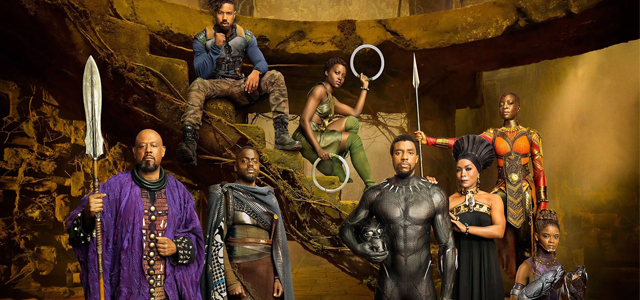Review: Black Panther
(M) Chadwick Boseman, Andy Serkis, Michael B. Jordan, Lupita Nyong’o
Marvel has done it again. No, scratch that. Marvel has done it better and it’s about time. This origin film cements Black Panther in the onscreen Marvel Universe. It’s a boom reverberating among super hero fans and more importantly it’s another welcome and positive role model for the next generation.
Black Panther/T’Challa (Chadwick Boseman) returns to his homeland Wakanda after his father’s death in Captain America: Civil War. He is crowned King upon his return but his succession is challenged by Claw (Andy Serkis) and Erik Killmonger (Michael B. Jordan) who are after the powerful substance, vibranium. It just so happens that Wakanda rests on top on the largest and only deposit of vibranium on earth. Honing and learning from the substance the people of Wakanda have been able to make technological advancements surpassing the rest of the world. Vibranium is also what gives the Black Panther his powers. King T’Challa/Black Panther teams up with CIA Agent Evertt K. Ross and members of Dora Milaje to stop a possible world war and protect Wakanda—a nation that has thrived for thousands of years by staying hidden.
This film was a bit more personal for me. Having been born in Africa and now living in Australia, I wanted Black Panther to live up to the hype and I am relieved that it did.
Never before have I seen Africa and its intricate culture celebrated and shown in such a positive way on film. How can a superhero film beat out bio-pics for truly embodying empowerment of a nation that has so long been fraught with the sentiments of weakness and corruption? Well, Black Panther did that.
Look, I get that this is a fictional world, but the story holds an idea.
An idea that can let a young child know that their skin, their accent, their ancestry, or their learning abilities are not barriers but are important pieces of themselves. That yes, you can amount to something more and care for others around you. It’s empowerment in its simplest form. It wasn’t the same “Oh poor Africa” world view that has been overplayed in both Hollywood and political representations. Wakanda is something different; with its technological superiority, the nation is epitome of advancement— a mix of tradition and unashamed progression. Wakanda’s warriors are all women after all.
Black Panther is the first Marvel film with a predominately black cast, that included Hollywood heavy-weights Forest Whitaker, Sterling K. Brown, Angela Bassett, Lupitya Nyongo and Michael B. Jordan. Andy Serkis (Planet of the Apes) proved that, CGI or not, he can breath life into his characters. The film had humour, action and of course cameo from Stan Lee. It’s hard to pick out a stand out performance, because each character — even the ones on the ‘wrong side’— had redeemable qualities that were so human that you respected them. That’s credit to a story that is well fleshed out and doesn’t rely on over-sexualisation or crass language for laughs or story development.
The costume designs are vibrant, drawing inspirations from Burundi, Rwanda, Uganda and Nigeria. The soundtrack produced by influential rap artist Kendrick Lamar complemented the high intensity action scenes and gorgeous landscape of Wakanda.
There was one line that really summed up Black Panther. In one scene the world leaders looked to what they thought was a third world country and asked, “With all due respect, what do you have to offer.”
A coy smile on the King T’Challa’s lips, as if to say, “If only you could imagine.”
“What do you have to offer?” is creating space and opportunity for someone who thinks differently to show what they can do. To develop and invent. What do you have to offer? It’s a challenge that the writers and talented cast took on with pride.
Black Panther also poses the intriguing questions: If you have a Utopian society, why would you keep it hidden? Do you share this peace or keep it under the shadows for fear of corruption? In some sense Wakanda is plagued by the same self-preservation thoughts as the rest of the world. The ones that say, if you bring those who are struggling in this safe haven they will bring their problems with them. It’s also striking when the question of where Wakanda was as a nation when the people around them were taken as slaves and/or colonised. The film also explores the monsters we create when we shun family and abandon or betray each other.
The film shows no culture or continent — not even Wakanda — is without its flaws because we are created perfectly imperfect. We need to decide to be better and not turn a blind eye (it’s all getting a bit biblical here, I know). Maybe it’s those themes explored that also saw the cast sharing their faith testimonies on set. Actress Sope Aluko, who plays Wakanda Warrior Shaman, told OkayAfrica.com that the set felt like home.
“I didn’t feel like I was amongst stars, everyone was so down to earth and normal. During breaks we shared our testimony of how we got to where did and most of the people were testifying to God’s miracles, it was almost like church,” said Sope Aluko.
The powerful sentiments where translated onscreen with the characters showcasing the value of family and how we are all somehow connected.
The only fear for Black Panther is if they decide to do a sequel and it doesn’t reach the heights that this origin story leaped to. In any case we do get to see Black Panther and the Wakandan warriors back in Infinity War in cinemas April 2018.
Mildly put, there is an air of excitement of what Marvel does next.
Melissa Stewart





